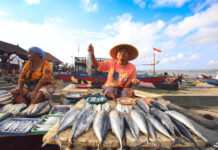“WE want to highlight the massive potential of animal-borne sensors to teach us about the oceans,” said lead author Dr David March, of Centre for Ecology and Conservation on Exeter’s Penryn Campus in Cornwall.
“This is already happening on a limited scale, but there’s scope for much more.
“We looked at 183 species – including tuna, sharks, rays, whales and flying seabirds – and the areas they are known to inhabit.
“We have processed more than 1.5 million measurements from floating sensors to identify poorly sampled areas (18.6% of the global ocean surface).”
“By comparing this with gaps in current observations by drifting profiling sensors (known as Argo floats) we identified poorly sampled areas where data from animal sensors would help fill gaps,” said Professor Brendan Godley, who leads Exeter Marine.
“These include seas near the poles (above 60º latitude) and shallow and coastal areas where Argo profilers are at risk of hitting the land.
“The Caribbean and seas around Indonesia, as well as other semi-enclosed seas, are good examples of places where Argo profilers struggle because of these problems.”
Tagged seals in the poles have already complemented ocean observing systems because they can reach areas under ice that are inaccessible to other instruments.
The study suggests data collected by turtles or sharks could also enhance ocean monitoring in other remote and critical areas such as tropical regions, with large influence on global climate variability and weather.
The researchers say their work is a call for further collaboration between ecologists and oceanographers.
Professor Godley added: “It is important to note that animal welfare is paramount and we are only suggesting that animals that are already being tracked for ethically defensible and conservation relevant ecological research be recruited as oceanographers. We do not advocate for animals being tracked solely for oceanography.”

















